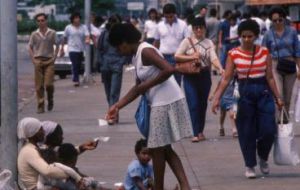MercoPress. South Atlantic News Agency
A majority of Latinamerican children (63%) live in poverty conditions, claims UN
 Street vendors, begging or homeless is the condition of many children in Latinamerica
Street vendors, begging or homeless is the condition of many children in Latinamerica Almost 63% of Latinamerican and Caribbean children and adolescents suffer some kind of poverty determined by the impairments which affect the full exercise of their rights and the income level of their families, according to a joint report from the United Nations Economic Commission for Latinamerica and Caribbean and the UN Children’s Fund, Cepal and Unicef.
The joint report states that poverty is determined when at least one of a child’s human, economic, social and cultural rights is not fulfilled.
“Children’s poverty: a priority challenge” measures different dimensions of children’s poverty in Latinamerica and the Caribbean, linking each of those experiences to the compliment or not of the International Conventions on Children’s Rights.
The report credited to Ernesto Espíndola and María Nieves Rico was done in 2008 and 2009 and considers such factors as nutrition, access to drinking water, sewage systems, the type and materials of the house and how many people live per room.
Other factors are school attendance and years of education, ownership of a radio, television set or phone and access to electricity, which if absent is considered a major condition of poverty and social exclusion. The report takes into account the household level of income and the potential capacity of those resources to help satisfy basic needs.
“Children’s poverty is a clear expression of social exclusion and the mechanism by which such a condition is reproduced. Even when children in a situation of “moderate poverty” are not so exposed in their living conditions, their future opportunities are seriously curtailed”, point out Espíndola and Rico.
Insufficient nutrition, poor education or dropping out of school, the lack of expectations and the discrimination suffered for being poor, not only affect children’s current rights, but will also most probably condemn them to remain in the lower brackets of the social scale. This means that when they become adults they will repeat the precarious conditions of their live hoods and thus ensure contagion of those conditions to the following generations.
The report points out that in the same way that poverty has many different dimensions, the response of governments to combat it must be multi-sector.
“Infant population severe and moderate privations can be overcome with the direct participation of the State, through the provision among other things of health and nutrition services, access to drinking water and a sewage system, and indirectly by helping lift the income of their households”, is one of several conclusions of the report.




Top Comments
Disclaimer & comment rules-

-

-

Read all commentsAnyone remember the South American poster who tried to compare UK and US “poverty” with that in South America?
Jun 24th, 2010 - 04:47 pm 0Quiet isn't he?
Child poverty is of no importance when there are barren windswept archipelagos to seize.
Jun 24th, 2010 - 05:03 pm 0With their GDP, Argentina must be on the bottom of the pile.
Jun 27th, 2010 - 05:32 pm 0Argentina GDP ($m) 310,065 Pop. 40,134,425
United Kingdom GDP ($m) 2,183,607 Pop. 62,041,708
Commenting for this story is now closed.
If you have a Facebook account, become a fan and comment on our Facebook Page!